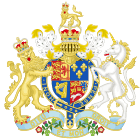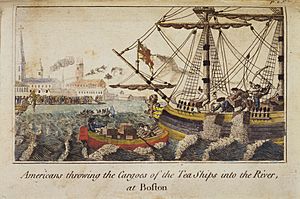Tea Act facts for kids

|
|
| Long title | An act to allow a drawback of the duties of customs on the exportation of tea or oil to any of his Majesty's colonies or plantations or farms in America; to increase the deposit on bohea tea to be sold at the East India Company's sales, and to empower the commissioners of the treasury to grant licenses to the East India Company to export tea duty-free. |
|---|---|
| Citation | 13 Geo. 3 c. 44 |
| Introduced by | The Rt. Hon. Lord North, KG, MP Prime Minister, Chancellor of the Exchequer & Leader of the House of Commons |
| Territorial extent | |
Quick facts for kids Dates |
|
| Royal assent | 10 May 1773 |
| Commencement | 10 May 1773 |
| Repealed | 1861 |
| Other legislation | |
| Repealed by | Statute Law Revision Act 1861 |
| Relates to | |
|
Status: Repealed
|
|
| Text of statute as originally enacted | |
The Tea Act of 1773 was a law passed by the Parliament of Great Britain. Its main goal was to help the East India Company, a big British trading company, which was in financial trouble. The company had a huge amount of tea stored in its warehouses in London.
Another goal of the Tea Act was to make legal tea cheaper than smuggled tea in Britain's North American colonies. The British hoped this would encourage colonists to buy the company's tea. By doing so, colonists would also pay the Townshend duties (a tax on tea). This would show that they accepted Parliament's right to tax them. At the time, about 86% of all tea in America was smuggled from the Dutch.
The Act allowed the East India Company to ship its tea directly to North America. It also meant the company didn't have to pay certain taxes on tea when exporting it from Britain. However, the Townshend tax collected in the colonies still had to be paid. The law became official on May 10, 1773.
Colonists in the Thirteen Colonies quickly understood what the Act meant. Many merchants, smugglers, and craftspeople, who had fought against the Stamp Act 1765, came together to stop the tea from being delivered. People who were supposed to receive the tea for the company were bothered. In many colonies, people successfully stopped the tea from being unloaded.
In Boston, this resistance led to the famous Boston Tea Party on December 16, 1773. Colonists, some dressed as Native Americans, boarded tea ships in the harbor and threw all the tea into the water. The British Parliament reacted strongly to this event. They passed the Coercive Acts to punish Massachusetts. They also made General Thomas Gage the new royal governor of Massachusetts. These actions made tensions even worse, leading to the start of the American Revolutionary War in April 1775.
The British Parliament later passed the Taxation of Colonies Act 1778. This law removed several taxes, including the tea tax. It was part of an effort to make peace with the American colonists. However, the colonists rejected these offers. The Tea Act became an old, unused law, but it wasn't officially removed from the law books until 1861.
Contents
Why the Tea Act Was Needed
In the 1760s, the East India Company had to sell all its tea in London. They paid a tax of about two shillings and six pence per pound on this tea. Merchants who specialized in the tea trade would then buy this tea and ship it to North America to sell.
The Problem of Smuggled Tea
The taxes and the markups by merchants made British tea expensive in the colonies. This created a great chance for American merchants to smuggle cheaper tea from the Dutch. These illegal shipments went against British trade laws. Smugglers brought in about 900,000 pounds of cheap foreign tea each year. The quality of this smuggled tea was not as good as the East India Company's tea. Americans bought about 562,000 pounds of the taxed British tea each year. Even though British tea tasted better, some American Patriots, like the Sons of Liberty, encouraged people to drink smuggled tea. This was a way to protest the Townshend taxes.
Britain's Financial Troubles
In 1770, most of the Townshend taxes were removed, but the tax on tea remained. People resisted this tax by avoiding legally imported tea. This caused a big drop in demand for the East India Company's tea in the colonies. The company ended up with a huge amount of unsold tea in its English warehouses.
By 1773, the East India Company was almost collapsing. This was partly because they had to pay the British government £400,000 every year. Also, a war and a terrible famine in Bengal greatly reduced the company's income from India. There was also economic weakness in European markets.
Lord North's Plan
Benjamin Franklin and others suggested that things would get better if the company could send its tea directly to the colonies without paying the taxes it paid in London. The British government, led by Lord North, saw a chance to solve several problems with one law.
If the company could ship tea directly to the colonies, it would remove the extra costs added by middlemen. Also, reducing or removing the taxes paid when the tea landed in Britain (if it was going to the colonies) would make the final cost of tea in the colonies even lower. This would make the company's tea cheaper than smuggled tea. The British hoped that colonists would willingly buy the cheaper company tea, which still had the Townshend tax. This would then make Parliament's right to tax the colonies seem acceptable.
What the Act Said
The Tea Act became law on May 10, 1773. Here are its main points:
- The East India Company could get a special permit to send tea to North America.
- The company no longer had to sell its tea at the London Tea Auction.
- Taxes on tea (charged in Britain) that were meant for North America or other foreign places would either be given back or not charged at all.
- People who received the company's tea in the colonies had to pay a deposit when they got the tea.
Some people suggested removing the Townshend tax on tea too. But Lord North disagreed. He said those tax revenues were used to pay the salaries of British officials in the colonies.
How the Act Was Put into Action
The British government gave the East India Company permission to ship tea to major American ports. These included Charleston, Philadelphia, New York City, and Boston. The people chosen to receive the tea and arrange its sale were usually favorites of the local governor. For example, in Massachusetts, Governor Thomas Hutchinson partly owned the business hired to receive the tea in Boston.
How Colonists Reacted

Many colonists were against the Tea Act. It wasn't just about helping the East India Company. It was mostly because the Act seemed to confirm that Britain had the right to tax tea. Merchants who had been legally importing tea would lose their business. Also, those who smuggled Dutch tea would be hurt by the company's lower prices.
These groups joined together. They argued that the taxes and the company's special monopoly were reasons to oppose the Act.
Tea Protests Across the Colonies
In New York and Philadelphia, protests against the Act led to the tea being sent back to Britain. In Charleston, colonists left the tea on the docks to rot. Governor Hutchinson in Boston insisted on keeping the ships in port. However, watchful colonists refused to let the tea be unloaded.
Things reached a breaking point when the deadline for unloading the tea and paying the Townshend taxes was about to pass. On December 16, 1773, colonists dressed as Native Americans boarded three tea ships. They then dumped all the tea into the harbor. This event is now known as the Boston Tea Party. Similar "Destruction of the Tea" happened in New York and other ports soon after. However, Boston faced the harshest punishment from Britain because it was the first "culprit."
What Happened Next
The Boston Tea Party shocked British politicians. The action united all groups in Britain against the American colonists. Parliament passed the Boston Port Act, which closed Boston Harbor until the dumped tea was paid for. This was the first of the so-called Coercive Acts, or Intolerable Acts as the colonists called them. Parliament passed these harsh laws in response to the Boston Tea Party. These measures further united many colonists in their anger against Britain. They were one of the many reasons that led to the American Revolutionary War.
The Taxation of Colonies Act 1778 later removed the tea tax and other taxes on the colonies. But this was not enough to end the war. The Tea Act became an "unused law" for the Thirteen Colonies. It was officially removed from the law books in 1861.
See also
 In Spanish: Ley del Té para niños
In Spanish: Ley del Té para niños
 | Audre Lorde |
 | John Berry Meachum |
 | Ferdinand Lee Barnett |

